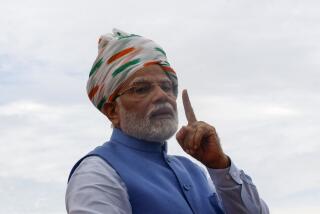BBC: Now, a Credibility Gap
- Share via
In the world of broadcast journalism the British Broadcasting Corp. holds a special place. Its well-deserved reputation for integrity, independence and high standards has been earned over more than six decades. It is a model for journalists and a boon for its viewers and listeners. In addition to its domestic service the BBC external service brings news of unchallenged accuracy to millions of shortwave listeners. In some places it is the only source of impartial information.
So it is dismaying that the government of Prime Minister Margaret Thatcher leaned on the BBC to get it to cancel a television documentary that included an interview with Martin McGuinness, a reputed leader of the Irish Republican Army. Thatcher says that terrorists should not be given publicity. The 2,000 journalists at the BBC staged a one-day protest strike Wednesday, calling the government’s action censorship and decrying the decision to override the accepted procedures of the corporation. Other broadcast journalists joined the protest, effectively knocking out Britain’s radio and television news for a day.
This incident is believed to be the first time that the British government, which provides the money for the BBC, has ever interfered with what it broadcasts. Previous governments have undoubtedly wished that they could shape the reporting of the news this way or that, but have wisely held off, knowing that the BBC’s reputation for honesty and independence is more important than a particular story or issue. Once people get the idea that the government is pulling the strings behind news reports, their credibility plummets. Whether an interview should be broadcast with a leader of the Irish Republican Army, hijackers in Beirut or anyone else is a decision for independent news executives to make--not the government.
What’s at stake is not so much the interview, it’s the audience’s confidence in the believability of what is being aired. Once that is shaken, the damage is far greater than the damage from giving air time to terrorists--who, incidentally, have received more publicity from the flap over the cancellation of the program than they would have had if it had simply been broadcast.
More to Read
Sign up for Essential California
The most important California stories and recommendations in your inbox every morning.
You may occasionally receive promotional content from the Los Angeles Times.













